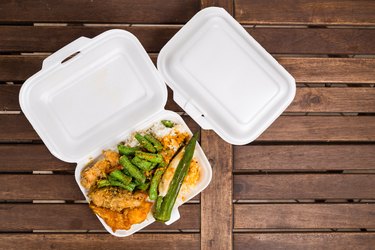
After eating a greasy cheeseburger with french fries, you may find yourself feeling sluggish and ready for a nap. Your body has to work hard to digest fat, which takes up a lot of energy.
In fact, fat is the most slowly digested macronutrient, followed by protein and then carbohydrate. How long your body takes to digest a fatty meal depends on several factors, including the size of the meal and the exact macronutrient makeup.
Video of the Day
Video of the Day
Tip
Digestion of a fatty meal depends on many factors, but it may take your body up to three days to fully process a high-fat meal.
Understanding Digestion
Digestion is the process of breaking down macronutrients — carbs, fats and proteins — into smaller components that can be absorbed into your bloodstream and sent around your body to where they are needed to support physiological function.
The digestive process differs for carbs, fats and proteins, as does the amount of time it takes for each macronutrient to digest. While carbohydrate digestion begins in the mouth when you take a bite, fat digestion doesn't begin until it reaches the small intestine.
Also, compared to protein and carbs, fat molecules are more complex, which means they're harder for your body to break apart, which adds to the digestion time.
Factors Affecting Digestion
Eating a big meal rich in fat will slow digestion more than eating a small meal rich in fat because there's more for your body to digest. The exact macronutrient mix also plays a role.
A creamy, high-fat Alfredo sauce over a plate of fettuccine or a bowl of gooey mac n' cheese will digest more quickly than a thick, fatty burger. This is because there are more carbs in the pasta meals and more protein in the burger.
The Colorado State University website reports that digestion rates vary considerably among individuals and can be affected by psychological stress, gender and reproductive status.
Average Transit Time
With all the factors involved in digestion, it's impossible to know how long a specific fatty meal will take to digest. According to authors of the book "Nutritional Sciences: From Fundamentals to Food," it takes 24 to 72 hours for complete digestion of food — from the time you take your first bite until the food waste is excreted from your body.
Since fat takes the longest to digest, you can expect that a fatty meal will be fully digested in closer to 72 hours than 24 hours. You can further estimate that a fatty meal higher in carbs than protein will digest more quickly than a fatty meal higher in protein than carbs.
Fat and Your Health
You need some fat in your diet to aid the absorption of fat-soluble vitamins A, E, D and K and to build all the body's cells. According to the Dietary Guidelines for Americans 2015, adults should get 20 to 35 percent of their calories from fat.
However, the type of fat you eat and the amount you eat at one time has implications for your health and your energy levels. Saturated fats found in animal foods and trans fats found in commercial baked goods are unhealthy fats that can increase your risk of heart disease and stroke.
Get the majority of your fats from unsaturated sources such as fatty fish, nuts and seeds and vegetable oils. Eat smaller meals with a balance of macronutrients to avoid overloading your digestive system, which can zap your energy.
- Merck Manuals: Carbohydrates, Proteins, and Fats
- NIH: Your Digestive System and How It Works
- Colorado State University: Gastrointestinal Transit: How Long Does It Take?
- Nutritional Sciences: From Fundamentals to Food; Michelle McGuire and Kathy Beerman
- Linus Pauling Institute: Metabolism of Dietary and Endogenous Fats
- American Heart Association: Know Your Fats